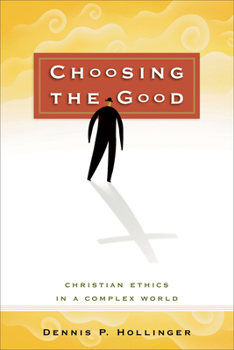Choosing the Good: Christian Ethics in a Complex World
Select Format
Select Condition 
Book Overview
Provides a discussion of the foundations and methods in ethics and ways to apply a Christian worldview to a secular culture.
Format:Paperback
Language:English
ISBN:080102563X
ISBN13:9780801025631
Release Date:September 2002
Publisher:Baker Academic
Length:300 Pages
Weight:1.04 lbs.
Dimensions:0.8" x 6.0" x 9.0"
Age Range:18 years and up
Customer Reviews
2 ratings
thought provoking
Published by Thriftbooks.com User , 16 years ago
This is a good and thought provoking book. It shatters misconceptions and challenges foundations
An Excellent Primer
Published by Thriftbooks.com User , 17 years ago
The goal of this book is to introduce the Christian reader to the broad discipline of ethics and its many facets, and to provide a specifically Christian perspective on the discipline and practice of ethics. The book begins by discussing the importance of ethics and attempting to distinguish Christian ethics from both other approaches to doing ethics and from other areas of Christian concern, such as pastoral care. Hollinger understands Christian ethics to involve both theory and application, and to be rooted in a specifically Christian worldview "that gives account of who we are as human beings, what is fundamentally wrong with the human condition, and what remedy exists for that malady." (16) The book is divided into four major sections that deal with various aspects of the theory and practice of ethics. The first section, "The Foundations of Christian Ethics," introduces the reader to some of the most prominent foundational theories of ethics. Hollinger looks at and critiques utilitarianism, principle based ethics, and character or virtue ethics, noting positive and negative aspects of each approach and concluding that none of them provides a sufficient foundation for the theory or practice of Christian ethics. He concludes this section of the book with a chapter on the importance of a Christian worldview foundation for doing Christian ethics. The second section of the book, "The Context of Christian Ethics," deals with the contexts in which Christians must attempt to formulate and live out their various ethical commitments. Hollinger devotes a chapter to both modernity and postmodernity as the key contexts in which Christian ethics must now be done. He explains what he sees as the primary defining features of each context and the challenges they present for Christian ethics. I suspect the author's treatment of postmodernity may be controversial for some readers. Exactly what constitutes the defining characteristics of postmodernity is still a highly disputed question, and Christian thinkers favorably predisposed towards postmodern perspectives may disagree with Hollinger's summary of its defining traits or find it overly negative. The third section of the book, "Making Ethical Decisions," deals with the various factors that go into making ethical decisions. Hollinger uses a threefold typology taken from Edward Long to explore the different ways ethical decisions can be made. This typology includes prescriptive, deliberative and relational motifs for ethical decision making. Hollinger analyses and critiques each motif before setting out his own conclusion that Christian ethical decisions must be made within a "priority of modified prescriptivism." (147) This conclusion is rooted in Hollinger's understanding of a Christian worldview and the theological perspective that arises from it. In further chapters Hollinger explores the use of the Bible and the place of empirical judgments in making ethical decisions. The last section of the b






